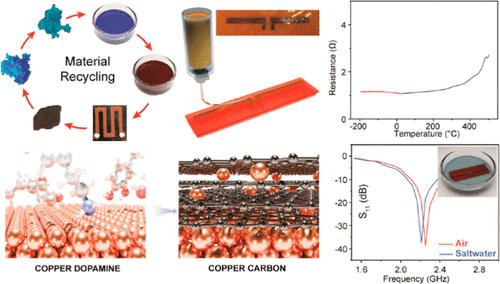Gradient Corrosion-Resistant Copper Using Molecular Decomposable Ink from Recycling
IF 4.3
3区 材料科学
Q1 ENGINEERING, ELECTRICAL & ELECTRONIC
引用次数: 0
Abstract
Oxidation and corrosion present significant challenges for copper in critical applications such as electronics. Graphene-like carbon materials hold promise for preventing oxidation and corrosion, but their application to metallic surfaces is hindered by a complex immobilization process. Herein, we describe copper-based molecular decomposable inks derived from recycling which enable in situ conversion to form a copper─graphitic carbon hierarchical structure. This structure withstands severe corrosive and oxidative environments and maintains stable performance across a wide temperature range, from cryogenic (−193 °C) to high temperature (500 °C) conditions. The graphitic carbon shell acts as an effective barrier, preventing oxidation and corrosion by creating lengthy diffusion routes within the hierarchical copper matrix. This enables the reliable operation of a printed antenna under a corrosive environment in a reliable fashion. The results show that the copper with a graphitic carbon shell has excellent oxidation and corrosion resistance capabilities, and the findings can be expanded to establish printed molecular decomposable materials as a platform for rapid prototyping of anticorrosion and antioxidation electronics suitable for different environmental conditions.

利用回收的分子可分解油墨实现梯度耐蚀铜
氧化和腐蚀给电子产品等关键应用中的铜带来了巨大挑战。类石墨烯碳材料有望防止氧化和腐蚀,但其在金属表面的应用受到复杂固定过程的阻碍。在本文中,我们介绍了从回收利用中提取的铜基分子可分解油墨,这种油墨可就地转化形成铜-石墨碳分层结构。这种结构可抵御严重的腐蚀和氧化环境,并在从低温(-193 °C)到高温(500 °C)的宽温度范围内保持稳定的性能。石墨碳外壳是一道有效的屏障,通过在分层铜基体中形成较长的扩散路径来防止氧化和腐蚀。这样,印刷天线就能在腐蚀环境下可靠地运行。研究结果表明,带有石墨碳外壳的铜具有出色的抗氧化和抗腐蚀能力,研究结果可扩展到建立可分解印刷分子材料,作为快速制作适用于不同环境条件的抗腐蚀和抗氧化电子器件原型的平台。
本文章由计算机程序翻译,如有差异,请以英文原文为准。
求助全文
约1分钟内获得全文
求助全文
来源期刊

ACS Applied Electronic Materials
Multiple-
CiteScore
7.20
自引率
4.30%
发文量
567
期刊介绍:
ACS Applied Electronic Materials is an interdisciplinary journal publishing original research covering all aspects of electronic materials. The journal is devoted to reports of new and original experimental and theoretical research of an applied nature that integrate knowledge in the areas of materials science, engineering, optics, physics, and chemistry into important applications of electronic materials. Sample research topics that span the journal's scope are inorganic, organic, ionic and polymeric materials with properties that include conducting, semiconducting, superconducting, insulating, dielectric, magnetic, optoelectronic, piezoelectric, ferroelectric and thermoelectric.
Indexed/Abstracted:
Web of Science SCIE
Scopus
CAS
INSPEC
Portico
 求助内容:
求助内容: 应助结果提醒方式:
应助结果提醒方式:


